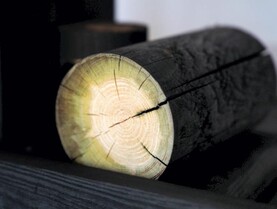The Murray Timber Group has just completed a €25m investment programme in new and replacement technology. The family-owned company has two sawmills – Ballygar, Co Galway, and Ballon, Co Carlow. Between them, the plants process 600,000m3 of logs annually - the equivalent of 20,000 lorry loads of logs.
When a group of Irish Farmers Journal journalists recently visited the Ballygar mill, the final phase of the investment programme had been completed. We met the Murray brothers, John and Patrick, and their father, Paddy, who established the mill in the 1970s.
When asked about the capability of Irish sawmills to process the increased volumes of timber coming on the market – this is set to double by 2035 – John Murray outlined the company’s plans.
“We are currently processing 600,000m3 on a single shift both in Ballygar and Ballon, but our investment programme is geared towards a capacity of up to 1.1m m3 of logs on two shifts.”
Log supply
The Murrays are well aware that log supply is forecast to double by 2035 so the recent investment, which includes a high spec log-in feed installation unit is just part of a continuous investment programme, according to John Murray. “We never stop investing and looking at new ways of doing things as there are always ways to improve both here and in Ballon,” he said.
Paddy, John, and Patrick demonstrated their ambition and also the versatility of both mills when they transformed their operation from a solely domestic timber supplier to a predominantly export trader after the economic crash in 2008.
“Computerisation has transformed sawmilling from the forest to the end product,” said John Ryan, the group’s purchasing manager, when we met him on a clearfell site in one of Coillte’s Mountbellew forest properties.
“Computerisation begins in the harvesting site where logs are segregated into various categories including commercial large sawlog for construction, medium logs for pallets and stakes, down to small logs for pulpwood,” he explains.
“In this clearfell site, the pulp material is retained by Coillte for its two wood-based panelboard (WBP) mills in Clonmel and Waterford Harbour.”
Processing
Once the logs are unloaded in the yard they are quickly processed. The mill needs a sufficient reserve to ensure two to three weeks’ supply and avoid future logistical problems.
John Ryan explains how weather and complex regulation can slow down or stop harvesting.
For example, harvesting operations had to be suspended recently on some sites during prolonged wet weather.
“There are also times when harvesting is postponed to conform with habitat regulations to protect bird breeding sites,” he says.
The importance of computerisation is immediately obvious once the logs are fed into the system in Ballygar. They begin their rapid journey through the mill involving electronic measuring, scanning – up to 12 scans – grading and cutting before they emerge as the sawn product for a variety of uses. All this electronic precision is to maximise the sawn product and minimise the residue of chips, sawdust and bark.
Mechanical grading ensures that sawn boards conform to the C16 strength and stress grade set by the National Standard Authority of Ireland (NSAI).
The massive biomass heated kilns ensure the correct moisture content is consistent and below 20%. All boards are stacked and presented to “eased edged planed all over” finish for ease of handling.
Even the residue has a value, including generating energy in the kilns, while the remainder is sold on to WBP mills or for energy generation. This ensures there is no waste in wood processing in Ireland.
Apart from construction sawn boards, the mill produces a wide range of fencing and decking material as well as pallet timber. Products such as fencing and decking needs to be pressure treated with “green” preservatives.
Markets
The group exports to the UK, which is the second biggest global market for sawn softwood. While Ireland is fortunate to have such a large market close by, the competition is fierce. Market share is dominated by Sweden (42%), Latvia (16%) and Finland (14%). But Murrays is able to compete in this market where Ireland punches above its weight.
Irish sawmills have increased market share over the years to 7%. Although low compared with the big players, Ireland is ahead of Germany (6%), Estonia (2%) and countries such as Poland, Belgium and Austria (1% each).
Murrays is a major contributor to the local and national economy.
“We currently employ 170 directly which increases to almost 400 jobs when harvesting, haulage and service jobs are added,” said Patrick Murray.
Forestry programme
John Murray is extremely critical of the Department’s forestry programme which he says has all but wiped out afforestation. The virtual cessation of new planting and the mandatory requirement that 35% of new forests are either unplanted or stocked with unproductive native species is a major disincentive.
“Even yield on reforestation sites will be dramatically minimised due to constraints and setback conditions,” he says.
The two Murray mills have Forest Stewardship Council (FSC) chain of custody certification which demonstrates to customers that logs are sourced from sustainably managed forests.
However, the mill can only purchase a maximum of 30% of their log supply from uncertified forests. They are now at this threshold and will exceed it when the mill goes on a double shift to cater for forecasted increase in log supply from private growers, mainly farmers.
John Murray believes the Department needs to be actively involved in certification. While recent Department licence returns show an annual total supply potential of 6.1m m3 of logs – divided almost equally between Coillte and private – he is not convinced of the availability of these volumes and even if they are realised, he maintains that Irish sawmills, including Murrays, will be severely restricted in purchasing logs from private growers due to the 30% certification threshold.






 This is a subscriber-only article
This is a subscriber-only article










SHARING OPTIONS: